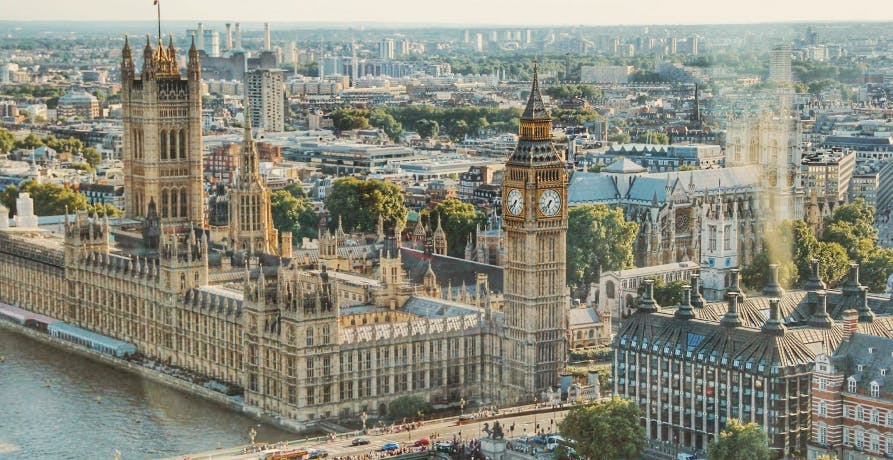
Impacts, Risks, and Opportunities (IRO) for CSRD Reporting
In this article, we’ll break down what IROs are, how to identify and assess them, and what CSRD requires in terms of disclosure.
ESG / CSR
Industries



The Climate Change Act 2008 is the UK’s legal basis for responding to and dealing with climate change. It commits the UK Government by law to reducing greenhouse gas emissions and provides a comprehensive climate change mitigation and adaptation framework for the UK.
👉 In this article we’ll explore the UK’s Climate Change Act in more detail and discover what exactly it involves.
The UK Climate Change Act was a world-first national legislation that created a legally binding climate change mitigation target. It received almost unanimous support across the political parties in the UK when it was enacted by the UK Government in 2008. It creates a comprehensive framework for the UK’s climate change response.
The UK Climate Change Act 2008 contains a legally binding goal of reducing the UK’s greenhouse gas emissions by 2050. When the legislation was originally introduced in 2008, the initial target was a reduction of 80% below 1990 levels. However, this has since been updated in response to the 2015 UN Paris Agreement, and in 2019 the goal was changed to 100% below 1900 levels by 2050 - in other words net zero greenhouse gas emissions.

In order to reach the UK’s long-term emissions goal (ie. net zero emissions by 2050) the Climate Change Act introduced carbon budgets. These are interim emissions reduction milestones covering five year intervals and creating a pathway to net zero in 2050. The carbon budgets are legally binding limits for greenhouse gas emissions in the UK and act as a cap on emissions.
The carbon budgets are set by the UK Government 12 years ahead of time, upon the advice of the Climate Change Committee (CCC). This gives enough time for business and individuals to prepare and for the Government to adopt policies to facilitate the delivery of the carbon budgets.
When recommending on what the new carbon budget should be, the Climate Change Committee takes into account considerations such as the latest scientific evidence, international developments and obligations (for example the UN Paris Agreement targets), as well as the cost effectiveness, and projected impact on business competitiveness and the wider UK economy.
The UK Government takes the Climate Change Committee's recommendation into consideration before presenting its own proposal to parliament who will set the carbon budget into law.
The first three carbon budgets were set in 2008 and cover the period of 2008 to 2023. The fourth carbon budget was set in 2011 and covers the period of 2023 to 2027. The fifth carbon budget covers the period of 2028 to 2032, and the sixth carbon budget will cover 2033 to 2037.
According to the Committee on Climate Change the UK was successful in meeting its first and second carbon budget targets, and is on track to achieving the third (which aims to reduce emission levels by 37% compared to 1990 levels). However, it warns that as it stands, the UK risks falling short of meeting its fourth, fifth and sixth targets which ultimately have the target of a 78% reduction in emissions (compared with 1990 levels) by 2035.
🛩🚢 The scope of the sixth carbon budget (covering 2033 to 2037) was expanded to include international aviation and shipping emissions for the first time.
The UK Climate Change Act 2008 requires the UK Government to create and implement policy that will ensure that the carbon budgets can be reached.
The Act created an independent advisory body called the Climate Change Committee (CCC). It acts as a statutory advisor to the UK Government.
The Committee members are impartial and perform independent analysis. They provide recommendations to the UK Government on the appropriate levels of carbon budgets, as well as assessment and advice on the main climate risks faced by the UK.
In addition to its advisory role the Climate Change Committee also monitors the UK's progress with regards to reducing emissions and adapting to climate change risks. Reports on the UK's progress with regard to emissions reductions are produced every year by the CCC and reports on climate change adaptation are published every two years. The UK Government must respond to these progress reports and should adapt UK policy in line with the CCC’s recommendations.
👉 The Climate Change Committee is only advisory and final decisions on legal targets rest with the UK Government. However, the Government must take the advice into consideration. If the UK Government adopts different targets to those proposed by the CCC, it must disclose its reasoning why.

The UK Climate Change Act 2008 places the obligation on the UK Government to produce and publish a UK Climate Change Risk Assessment (CCRA) every five years. The goal of the risk assessment is to provide an overview of current and future risks and opportunities arising from climate change in the UK.
The Climate Change Act also requires that the UK Government publish a National Adaptation Programme (NAP) in response to the Climate Change Risk Assessment. The NAP sets out the actions that the government will take to adapt to the challenges identified by the CCRA.
The UK Government published its third five-year Climate Change Risk Assessment in January 2022. The report concluded that the UK Government needs to do more to build up its long term climate change resilience to avoid costly short term remedial action.
The UK Government is due to publish its National Adaptation Programme in response to this assessment. It’s due for publication in 2023 and will influence policy making in the UK for the coming years and beyond.
The two main government bodies in the UK, who are responsible for climate change policies are:
BEIS takes the lead on developing policies for reducing emissions in the UK (otherwise known as emissions mitigation). It is responsible for ensuring secure energy as well as promoting action on climate change both in the UK and abroad.
Defra leads on domestic adaptation policy. It is responsible for producing the National Adaptation Programme to address the risks identified by the UK Climate Change Risk Assessment, which is carried out every five years.
The UK Climate Change Act has greatly contributed to the UK’s ongoing reductions in greenhouse gas emissions. According to the Climate Change Committee by 2018 “the UK’s greenhouse gas emissions were 44% below levels in 1990”, even though the UK saw significant growth in its economy over the same period. Let’s take a look at some more of the UK Climate Change Act successes below:

Despite these achievements, the UK Climate Change Act is not without criticisms. One of the main criticisms levied against it for example is that progress has not been equally distributed. The power sector accounts for a majority of the emissions reduction, while other energy intensive sectors such as the transport sector have seen very little progress in emissions reductions. Let’s take a closer look at some of the other challenges faced by the UK Climate Change Act:
As the 2050 net zero deadline grows closer, more ambitious decarbonisation pathways are required, which will present challenges for UK policy makers and for the UK Climate Change Act itself.
The Climate Change Committee believes that if the UK wants to reach its obligations, more action and participation is required from all sectors of the economy. Not only this, but the UK population will need to be engaged on a much larger scale.
The Climate Change Act 2008 is a strong foundation, but supplementary measures are needed to ensure that the UK is on track to meet its net zero emissions targets.
Beyond achieving this goal, the UK must also step up its efforts to ensure that the UK is prepared for the impacts of climate change and that it is adapting to the changes in weather and the natural environment. The UK must work to improve its resilience to these inevitable changes.
At Greenly we can help you to assess your company’s carbon footprint, and then give you the tools you need to cut down on emissions. Why not request a free demo with one of our experts - no obligation or commitment required.
If you enjoyed this article, check out our legislation tracker to discover what frameworks, regulations and guidelines apply to your business and industry.